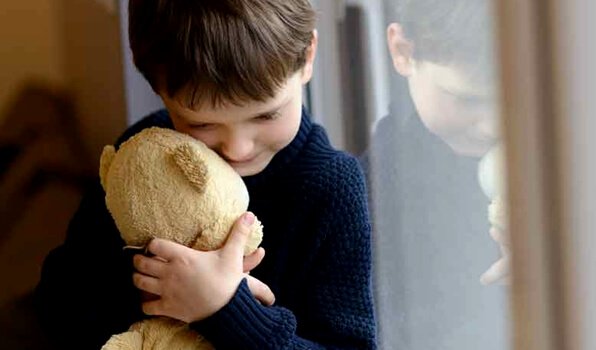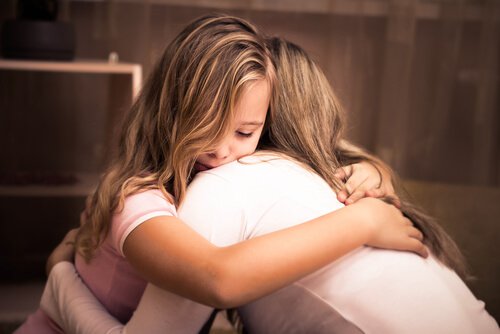Separation Anxiety - When Does it Become a Problem?

Separation anxiety is a situation we generally associate with children, but a lot of adults also experience it. It’s defined as feeling excessive anxiety when separated from one’s home or from people for whom there is a strong emotional attachment. This includes, for example, parents, grandparents, siblings, children, etc.
The symptoms can be mild or very severe and are similar in children as well as adults. In adults, it’s usually believed that it’s a problem that the person grew up with. But this is not always the case, it can emerge at any moment during one’s life.
It manifests as fear from separating from one’s partner, children, workplace, or something which has a lot of sentimental value. It can be very wearing for the individual who suffers it but also for the “objects of attachment.” Often, what it does is reflect or strengthen a dependency which already existed to some degree.
“May you be free to take a path without feeling the need to know its destination, nor the feverish anxiety of being sure that you are headed in a direction I would have wanted you to go.”
-Margaret Mead-
The concept of time is not easy and takes years to develop. For many children, any separation is difficult and provokes suffering and tears. Plus, if it is not managed properly by the parents, it could have serious consequences, such as insecurity during adolescence. It could even transcend into other stages of life.
As with all anxiety disorders, in childhood or adulthood, it’s very important to seek treatment for separation anxiety. Only on rare occasions does it disappear naturally. Usually, it tends to grow, branch out to other areas of life, and aid the development of other forms of anxiety. These include agoraphobia or panic disorder.

The recommended treatment is usually psychotherapy. However, when it comes to children, the information you gather and some tools we will offer you in this article will aid in preventing this situation. We will help you see the warning signs in case separation anxiety is just starting.
“Threats to our self-esteem or the idea we have of ourselves usually produce a lot more anxiety than do threats to our physical integrity.”
-Sigmund Freud-
It’s a normal phase
Certain anxiety over separation is normal and common during certain phases of development. Between the ages of 8 to 14 months, babies, which previously lacked a sense of danger, start to fear strangers or new places. This “normal phase” is a natural adaptation method which helps children adapt and dominate their surroundings.
Usually, this separation anxiety lowers considerably or disappears completely at around two years of age. Children at this age understand that their parents can go away, but they will always come back later. At the same time, they understand that they can go and come back too. With this new security, they find the courage to explore the world.
This does not mean that during specific or new moments or situations children cannot experience a certain degree of anxiety. This anxiety is more likely when they are separated from their parents for a prolonged period of time, when they face hospitalization, a change of school, etc.
Separation anxiety tends to provoke a lot of emotions
In this situation, parents can experience many emotions. There is a sensation of well-being due to the attachment the child has created for them. Also, it could generate feelings of guilt due to having to leave them with strangers. It’s also normal to feel exhausted or overwhelmed by the amount of attention and time the child demands.
“No passion so effectually robs the mind of all its powers of acting and reasoning as fear.”
-Edmund Burke-
The fact that your child doesn’t want you to go is a good sign of a healthy attachment. Of course, this is true as long as this desire doesn’t give way to a great deal of anxiety. A healthy attachment means there’s trust. Your child trusts that you will come back whenever you leave, and this is enough to keep them at ease while you’re away. A pathological attachment is produced when the child needs reaffirmation and security all of the time and when he doesn’t have the tools to confront new situations. Thus, these situations are difficult for them.
This is a difficult stage. However, the anxiety should disappear over time and with a lot of patience and strength. On the other hand, if you run into the room every time your child starts crying or you cancel all of your plans for them, it’s likely that they’ll refine their skills. Because they will become aware that they have the power to avoid this separation they dread so much.

Planning ahead and trying it out – two important concepts
If you’re planning to take your child to daycare, then you’re probably going to encounter the separation anxiety we’re referring to. Children are especially sensitive between the ages of 8 months to 1 year. If you have no other choice, practice the separation slowly by taking the child to new places or leaving him with some relative or caregiver for short periods of time. Do this more and more until the time comes to leave them in daycare.
Leave these “rehearsals” for times when your child is not tired, restless, or hungry. Plan to do it after he has eaten or taken his nap. Remember that he is just a child and it is much better to introduce changes when one’s basic needs are satisfied.
Anticipate the enrollment in daycare by visiting the it with them before their first day. Plus, if possible, make the adaption progressively. So at first the little one will only go for a couple of hours, and then slowly you can start increasing the amount of time you’re absent.
Coherence, tranquility, and keeping promises – 3 fundamental guidelines
If you’re taking your child to a particular daycare, it’s because you trust the professionals that work there. In this sense, try to be coherent with this decision. Let them help you manage the separation by following their advice. Keep in mind that they have a lot of experience handling this type of problem and are going to want the best for you and your child.
“There is nothing more characteristic of the progress from beast to man than the reduction of justified occassions to feel fear.”
–William James–
Stay calm and try to transmit tranquility and confidence to your child. Explain to them when you will be back by using concepts they can understand. For example, “after lunch”, “after nap time”, etc. You can create a goodbye ritual wherein the “goodbye” will be a warm, pleasant, and loving act. A moment where you dedicate your full attention to them. But when you leave and don’t come back. That could just make things worse.

Come through for your child
Come back when you promised to do so. This way, you will be nurturing the trust your child has for you and will be helping them overcome the situation better. Be punctual, especially during the adaptation process. Even though children don’t have a very clear sense of time, they will notice how the other kids leave and may feel worried because you’ve not come.
When it comes time to say goodbye, don’t hurry off, even if you see that they are okay. This could make them feel abandoned. Only leave after having properly said goodbye. But don’t unnecessarily prolong the farewell either. This attitude reinforces the feeling that the daycare may be a bad place or that what’s happening is very transcendent.
It’s not common for separation anxiety to persist every day or for long periods of time. If you are worried that your child is not adapting to being without you, consult an expert. Keep in mind that you could also be managing the situation inappropriately. You might require the assistance of a specialist as well.
Separation anxiety is a situation we generally associate with children, but a lot of adults also experience it. It’s defined as feeling excessive anxiety when separated from one’s home or from people for whom there is a strong emotional attachment. This includes, for example, parents, grandparents, siblings, children, etc.
The symptoms can be mild or very severe and are similar in children as well as adults. In adults, it’s usually believed that it’s a problem that the person grew up with. But this is not always the case, it can emerge at any moment during one’s life.
It manifests as fear from separating from one’s partner, children, workplace, or something which has a lot of sentimental value. It can be very wearing for the individual who suffers it but also for the “objects of attachment.” Often, what it does is reflect or strengthen a dependency which already existed to some degree.
“May you be free to take a path without feeling the need to know its destination, nor the feverish anxiety of being sure that you are headed in a direction I would have wanted you to go.”
-Margaret Mead-
The concept of time is not easy and takes years to develop. For many children, any separation is difficult and provokes suffering and tears. Plus, if it is not managed properly by the parents, it could have serious consequences, such as insecurity during adolescence. It could even transcend into other stages of life.
As with all anxiety disorders, in childhood or adulthood, it’s very important to seek treatment for separation anxiety. Only on rare occasions does it disappear naturally. Usually, it tends to grow, branch out to other areas of life, and aid the development of other forms of anxiety. These include agoraphobia or panic disorder.

The recommended treatment is usually psychotherapy. However, when it comes to children, the information you gather and some tools we will offer you in this article will aid in preventing this situation. We will help you see the warning signs in case separation anxiety is just starting.
“Threats to our self-esteem or the idea we have of ourselves usually produce a lot more anxiety than do threats to our physical integrity.”
-Sigmund Freud-
It’s a normal phase
Certain anxiety over separation is normal and common during certain phases of development. Between the ages of 8 to 14 months, babies, which previously lacked a sense of danger, start to fear strangers or new places. This “normal phase” is a natural adaptation method which helps children adapt and dominate their surroundings.
Usually, this separation anxiety lowers considerably or disappears completely at around two years of age. Children at this age understand that their parents can go away, but they will always come back later. At the same time, they understand that they can go and come back too. With this new security, they find the courage to explore the world.
This does not mean that during specific or new moments or situations children cannot experience a certain degree of anxiety. This anxiety is more likely when they are separated from their parents for a prolonged period of time, when they face hospitalization, a change of school, etc.
Separation anxiety tends to provoke a lot of emotions
In this situation, parents can experience many emotions. There is a sensation of well-being due to the attachment the child has created for them. Also, it could generate feelings of guilt due to having to leave them with strangers. It’s also normal to feel exhausted or overwhelmed by the amount of attention and time the child demands.
“No passion so effectually robs the mind of all its powers of acting and reasoning as fear.”
-Edmund Burke-
The fact that your child doesn’t want you to go is a good sign of a healthy attachment. Of course, this is true as long as this desire doesn’t give way to a great deal of anxiety. A healthy attachment means there’s trust. Your child trusts that you will come back whenever you leave, and this is enough to keep them at ease while you’re away. A pathological attachment is produced when the child needs reaffirmation and security all of the time and when he doesn’t have the tools to confront new situations. Thus, these situations are difficult for them.
This is a difficult stage. However, the anxiety should disappear over time and with a lot of patience and strength. On the other hand, if you run into the room every time your child starts crying or you cancel all of your plans for them, it’s likely that they’ll refine their skills. Because they will become aware that they have the power to avoid this separation they dread so much.

Planning ahead and trying it out – two important concepts
If you’re planning to take your child to daycare, then you’re probably going to encounter the separation anxiety we’re referring to. Children are especially sensitive between the ages of 8 months to 1 year. If you have no other choice, practice the separation slowly by taking the child to new places or leaving him with some relative or caregiver for short periods of time. Do this more and more until the time comes to leave them in daycare.
Leave these “rehearsals” for times when your child is not tired, restless, or hungry. Plan to do it after he has eaten or taken his nap. Remember that he is just a child and it is much better to introduce changes when one’s basic needs are satisfied.
Anticipate the enrollment in daycare by visiting the it with them before their first day. Plus, if possible, make the adaption progressively. So at first the little one will only go for a couple of hours, and then slowly you can start increasing the amount of time you’re absent.
Coherence, tranquility, and keeping promises – 3 fundamental guidelines
If you’re taking your child to a particular daycare, it’s because you trust the professionals that work there. In this sense, try to be coherent with this decision. Let them help you manage the separation by following their advice. Keep in mind that they have a lot of experience handling this type of problem and are going to want the best for you and your child.
“There is nothing more characteristic of the progress from beast to man than the reduction of justified occassions to feel fear.”
–William James–
Stay calm and try to transmit tranquility and confidence to your child. Explain to them when you will be back by using concepts they can understand. For example, “after lunch”, “after nap time”, etc. You can create a goodbye ritual wherein the “goodbye” will be a warm, pleasant, and loving act. A moment where you dedicate your full attention to them. But when you leave and don’t come back. That could just make things worse.

Come through for your child
Come back when you promised to do so. This way, you will be nurturing the trust your child has for you and will be helping them overcome the situation better. Be punctual, especially during the adaptation process. Even though children don’t have a very clear sense of time, they will notice how the other kids leave and may feel worried because you’ve not come.
When it comes time to say goodbye, don’t hurry off, even if you see that they are okay. This could make them feel abandoned. Only leave after having properly said goodbye. But don’t unnecessarily prolong the farewell either. This attitude reinforces the feeling that the daycare may be a bad place or that what’s happening is very transcendent.
It’s not common for separation anxiety to persist every day or for long periods of time. If you are worried that your child is not adapting to being without you, consult an expert. Keep in mind that you could also be managing the situation inappropriately. You might require the assistance of a specialist as well.
This text is provided for informational purposes only and does not replace consultation with a professional. If in doubt, consult your specialist.







